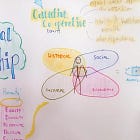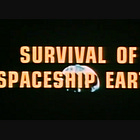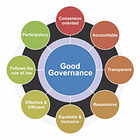The path to global cybernetic governance does not lie solely in machines or metrics—it lies in the capture of meaning itself. If Cybernetic Thomism was about translating data into ethics, then Cybernetic Empiriomonism is about the reprogramming of perception, identity, and belief systems at the cultural level around that ethic - a total integration of consciousness with systems theory, of mind with machine.
To understand how we got here, we must start with a philosophical lineage beginning with Kant’s categorical imperative and its attempt to mediate the limits of reason within confines of experience. But Hermann Cohen, Martin Buber, and Emmanuel Levinas took increasingly ethical turns — a move from knowledge of the world to responsibility to the Other, even without expectation of reciprocity — which Hans Jonas then applied within the realms of the future and the environment, with Hans Küng and Leo Swidler then fusing this into a global ethic, ultimately centred around planetary stewardship. A common set of values for all of mankind, in short.
These moves laid the groundwork for what followed: a move away from political sovereignty and legal frameworks, and toward universal ethical subjectivism through modelled future prediction. And this is precisely where Alexander Bogdanov’s Empiriomonism enters — the idea that knowledge is not objective, but the product of a collectivised subjective experience. Truth thus becomes consensus reality, and the consensus is set through global modelling.
The Rise of the Cultural Operating System
Bogdanov did not stop at epistemology. Through Proletkult, cultural forms — art, music, movies, literature — should be engineered to subtly direct the future of humanity. Tektology, his general science of organisation, provided the method while culture becomes a gateway to imprint an ethical code — with Hermann Cohen even arguing for its fusion through religion.
Fast-forward a century, and this logic has not been discarded, but refined. Integral Meta-Theory, as developed by Ken Wilber, offers total worldview integration, though this 'inclusivity' functions less like individualism and more like an imperative to conform. All perspectives are welcome — provided they’re fundamentally compatible with the universal moral code derived from the best available consensus science almost guaranteed to change.
The cultural layer of this system is not incidental, but it’s further where second-order cybernetics comes in — not just observing the system, but considering the human observer within. And that particular observer is best served interpretation in alignment with system purpose.
The Machinery of Meaning
And there is no shortage of frameworks, with Jonathan Haidt’s Moral Foundations Theory reducing ethical intuitions to six primary dimensions — harm, fairness, loyalty, authority, purity, and liberty. Under cybernetic logic, these become levers ripe for behavioural engineering.
Then compound Marc Gafni’s Unique Self theory, which promises to liberate the individual into purpose, but it does so by integrating the self within a much greater system, while the individual leans to accept this blatant suppression of personality ‘for the greater good’, where said ‘goods’ ultimately align with stakeholder objectives, ESG compliance, and planetary ethics.
Frameworks like Spiral Dynamics and AQAL thus contribute to a flexible, scalable, psychologically persuasive mechanism to reframe individual difference as grounds for human development, while any level of dissent is framed as immoral, which does not even warrant debate. And with this synthetic morality applied universally, society can be subtly manipulated or even controlled.
The End of the Outside
What we are left with is the abolition of escape. Cybernetic Empiriomonism creates a world in which meaning is viewed in light of numerical indicators and generalised metrics. There is no need for coercion as identity and cultural narratives are slowly assimilated into adaptive systems, where the world you experience is directly shaped by your personal decisions. If a brand of milk for some reason is deemed immoral to drink, then you will be subtly punished for consuming it. Consequently, your decisions will slowly but surely be guided in a set direction ‘for the common good’.
But the outcome of this universal moral code is not cultural hegemony in a traditional sense. It is something subtler, and harder to describe. It is the manipulative production of consensus reality by design, channelled through every means possible in the most subversive way imaginable — in real time.
Cybernetic Empiriomonism is not coming. It is already here. And it’s gaining strength by the minute.
Spaceship Earth: The Closed-System Justification
The conceptual groundwork for this transformation has been laid through the Spaceship Earth metaphor. Born out of environmentalism and systems theory, Spaceship Earth frames the planet as a closed ecological system — finite, fragile, and interdependent. Within this framing, the traditional structures of political debate, and national sovereignty are rendered obsolete, because what ultimately matters is survival — and that, for all of us.
This framing carries significant consequences. If the Earth is a closed system, then responsible management becomes the highest political good, and individual liberty a distant second. Governance is reframed as planetary stewardship, while democracy comes to operate within a framework dictated through scientific boundaries, set by experts and their opaque, unchallengeable models. Citizens are considered potential risks which should be controlled for the greater good. There is no external world into which one can opt out — every action, belief, and behaviour must be accounted for within the system's feedback loops lest you endanger our collective security.
Thus, resilience, sustainability, and adaptive governance cease to be ideals—they become obligations. Freedom is reconceived not as self-determination, but as correct alignment with systemic goals — and these will typically require education, on their terms. Risk-taking, dissent, and deviation are no longer seen as morally acceptable — they are interpreted as threats to planetary survival, with people engaging in these ostracised for daring to enganger us all.
Spaceship Earth thus serves as the closed-system moral justification for the complete absorption of human consciousness into cybernetic management. It demands continuous surveillance, behavior modification, and emotional conditioning, eventually leading to what is commonly framed as a collective consciousness.
And this is being normalised through what are presented as benign institutions and programs. UNESCO, WAAS, and countless other global governance bodies have worked for decades to embed values-based education frameworks into schools and policy. The push for 'global citizenship education' is not merely about inclusion — it’s about you accepting your station in life for the common good. Students are taught to become cosmopolitans, dissociated from their forebears, reared in the ethics of interdependence and planetary obligation, and engaging in mob justice for reasons they’re unlikely to truly even understand.
This process is then reinforced by lifelong learning initiatives and behavioural nudging systems, designed to continuously reform attitudes and perceptions in line with global governance imperatives served — from schoolbooks to Netflix menus — and carefully curated to embed the system’s normative framework — the global ethic. And as the system learns more about us, it adapts those nudges in real time.
This manipulation begins early. One of the key technologies of this emotional reengineering is Social and Emotional Learning (SEL), now embedded in school curricula around the world. Framed as a way to support students’ well-being and cooperation, SEL prioritises emotional over rational engagement because social scientists long ago discovered it to be the most effective method of manipulative conditioning.
As Hitler remarked, ‘I use emotion for the many and reserve reason for the few’. SEL is not teaching children how to think — it is teaching them what to feel, and when. Emotional framing becomes the delivery mechanism for the value system of the new order. Through SEL, children are taught to internalise the logic of the system not by argument, but by emotional triggers. They are being prepared, not to deliberate but to conform. And this is further emphasised through the restructuring of education itself around principles of systems theory itself.
Which brings us to the true frontier: Artificial Intelligence and Brain-Computer Interfaces.
In the world of AI ethics and neuroethics, the final battleground of Empiriomonism is being prepared. Where Bogdanov envisioned a collectively-subjective, generalised universal ethic, AI Ethics now promises to personalise that ethic at the individual level, through the delivery of a subjective-collective reality tailored to the user’s psychology. Through neuroadaptive interfaces, sentiment analysis, and behavioural modeling, the system can refine how information is delivered in real time — nudging thought before it even becomes language for a far more personal, effective strategy.
Your personal newsfeed, your educational content, your neural input via BCIs — all can be filtered not only for what you want, but for what you should believe. If you’re the reasoning kind, then AI ethics can reframe the information to carry more effect through convincing logic, and if you tend to be led by emotion, then AI Ethics can dynamically reframe around that aspect of the story. Now apply this principle in the context of elections, and it should become very clear that whoever get to adjust the mechanism of AI Ethics itself will become immensely powerful with time, as AI Ethics leads to Neuroethics, integrated through Brain-Computer Interfaces.
This isn’t merely control. It is epistemic entrapment. It is the ethical interface between your mind and the system, constantly adjusting your impressions for ‘maximum cognitive compatibility’—which in practical terms means maximum manipulation for maximum compliance.
The AI Ethics algorithm doesn’t silence you — it aligns you. The BCI doesn’t program you — it helps you 'realise' what you already know — filtered through the correct template leading to you becoming the moral agent which the Fabian society outlined was expressly their objective already early on.
And that is why this post is titled Cybernetic Empiriomonism, because it’s the final synthesis: where Bogdanov’s collectivised subjectivity meets AI-enabled personalisation. Where the universal moral framework becomes a dynamic, interactive script — adapted in real-time, and specifically tailored for you.
The real question is whether we can still recognise it before our capacity to see outside of it disappears entirely. Because while Twitter at this stage certainly ensures your timeline is free of ‘problematic’ tweets, just you wait until the day comes when it takes the liberty of reframing your tweets for the common good.
Cloaked in Care: The Moral Framework of the System
What makes Cybernetic Empiriomonism so insidious is not only its technical sophistication, but its moral camouflage. Global governance structures increasingly present their ambitions not as domination, but as care. Crisis, resilience, and protection are the moral currencies used to justify systemic reengineering. Adaptive management, ecosystem governance, lifelong behavioral retraining — all are framed as moral duties to the planet and each other.
The language of 'care' reframes control as compassion. Global surveillance per Moynihan in 1969 becomes 'worldwide monitoring of environmental health.' Cultural manipulation becomes 'fostering global empathy'. Behavioral nudging becomes 'encouraging pro-social behavior'. The conquest of the human mind is presented as its salvation, morally justified for the common good.
Through this framing, resistance is not treated as political disagreement — it is pathologised as selfishness, irrationality, or harm. The new moral order transforms dissent into moral deviance. This is why frameworks like ESGs, One Health, and global resilience indexes matter — they are not merely measurement tools; they are moral scoring systems embedded into the global architecture, which could eventually pave the road for an outright Social Credit System.
Thus, Spaceship Earth and the closed-system metaphor become more than just an ecological model — it becomes an ethical prison. Survival is the justification for total integration. You do not opt in or out of the system; you exist within it as a node in a vast, adaptive moral machine.
There is no outside.
And at the center of this project is the steady engineering of perception itself — from SEL in childhood, to AI-mediated information streams, to stakeholder-managed governance structures. Every layer of human experience is being quietly folded into the same recursive logic.
With care serving as justification, Cybernetic Empiriomonism is not only the final integration of meaning and control — it is the eventual extinction of human individualism itself.
Good Governance and Ethical Leadership: The New Moral Administration
In parallel with cultural reprogramming and technological integration, the political language surrounding authority has similarly been gradually redefined. What was once called rule, command, or sovereignty is now framed as good governance — a technical, ethical, and ostensibly neutral process aimed at managing the complexity of interconnected systems.
Good governance — as lauded by institutions like the UN, OECD, and World Economic Forum — depoliticises authority by clothing it in the language of responsibility, efficiency, and morality. Decision-making is no longer about democratically debated, contested visions; it is about managerial stewardship of pre-agreed systemic goals. Governance becomes primarily a question of technocratic expertise, and ‘ethical leadership’ — meaning leadership that aligns behaviour with adaptive systemic needs as opposed to popular will.
Ethical leadership is ultimately about optimising the human resource for systemic resilience. The leader becomes a systems coordinator, an emotional custodian, and a compliance manager. Political sovereignty is replaced by planetary trusteeship; dissent is reframed as dangerous irresponsibility.
Thus, good governance and ethical leadership serve as the administrative expressions of Cybernetic Empiriomonism. They provide the human face of the system’s non-human logic—a comforting interface for a governance model increasingly automated, algorithmic, and ethically predetermined.
Conclusion: A World Without Outside
What is being constructed is not simply a governance system, nor even a new culture — it is a total epistemic regime. One that integrates emotional life, spirituality, identity, individual moral judgment, and political action into a single, easily exploitable cybernetic framework.
The philosophical dreams of Empiriomonism — to create a collectively-subjective universal ethic — have found their machinery through AI, BCIs, SEL, stakeholder governance, and global surveillance, while closed-system metaphors like Spaceship Earth now conspire to make meaning itself a managed phenomenon.
It will not feel like coercion, but like responsible moral action and consensus. And it will be presented as progress, while eliminating individual liberty, by dissolving even the ability to imagine that anything else was ever possible.
Cybernetic Empiriomonism does not merely describe a future. It describes a world that is already here, tightening its feedback loops with every passing day.
And when BCIs eventually are wholesale adopted, individual human agency can be gradually phased out — exactly as intended.




















Great post - but seems to cut off abruptly...??!